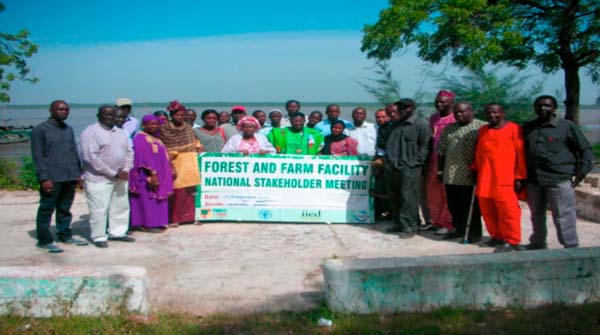
The outcomes of the two-day (Nov 17-18, 2015) National Stakeholders Meeting on Forest and Farm Facility Monitoring and Learning Framework will also feed into the development the FFF activities’ (in The Gambia) work plan for 2016.
The FFF is an initiative from the United Nations Food and Agriculture Organization, (FAO), International Institute for Environment and Development (IIED) and International Union for Conservation of Nature (IUCN) to support countries to improve their governance structures at different levels (local, national and regional) to achieve sustainable forest landscape management. It was launched in March 2013.
In his welcome remarks, the President of the National Farmers Platform of The Gambia (NFPG), Alhagie Basse Mboge, told participants that the forum is imperative to the success of FFF interventions in the country.
He explained that the workshop was designed to enable stakeholders to engage constructively to boost intervention outcomes.
Mr Mboge urged all, especially those implementing FFF funded projects, to share and learn from each other’s experiences, successes and challenges in the implementation of planned activities.
In his opening statement, the Chief of Kiang Central District, Alhagie Demba Sanyang, thanked FAO, IIED and IUCNfor supporting The Gambia through the FFF initiative.
He described the forum as timely given the state of implementation of FFF interventions, as well as the national drive to achieve food security and a host of other national development priorities such as the Programme for Accelerated Growth and Employment (PAGE).
Chief Sanyang noted that all these interventions, and the series of policies and legislations adopted by government, are all geared towards improving the livelihoods of the population while ensuring that sound environmental management principles are practised.
The Gambia, according to the chief, has made some giant strides towards forest landscape protection and management over the years.
“The government under the dynamic leadership of President Yahya Jammeh has demonstrated its commitment through the formulation of appropriate forest policy frameworks and the development of strategies since the mid-nineties.
Among these strategies is the Participatory Forest Management approach as enshrined in the Gambia Forest Management Concept (GFMC).
Presently, over 600 villages are involved in the participatory forest resource management programme and are managing over 31,000 hectares of forests nationwide.
“Recently, remarkable successes have been registered in The Gambia Community Forest Management Programme.
“The government comfortably handed over 77 community forests to the local population nationwide, and thereby increasing the number of hectares under final ownership stage to the local population.
“The efforts of all stakeholders in revitalising community ownership of forests in the country through FFF support cannot be overemphasized, especially efforts of the Regional Community Forest Task Teams of which I am a member, the National Farmers Platform of The Gambia, All-Gambia Forestry Platform, the Department of Forestry and the Ministry of Environment, Climate Change, Water Resources, Forestry, Parks and Wildlife Management.”
Chief Sanyang underlined the need for the proactive involvement of all in the implementation of FFF activities, for the realisation of the desired objectives.
“I, therefore, urge all of you to give every support to the implementing institutions and farmer-based organizations by strengthening the aspects of learning and sharing of experiences and stories, which are some of the principles of this meeting in Tendaba.”
The opening ceremony was followed by a series of presentations from the implementing institutions and beneficiary Forest and Farm producer organizations.
After each presentation, plenary discussions ensued to assess whether the results achieved adequately reflect (or not) the outcomes that the programme is trying to achieve in the country.
The conclusion of the meeting indicated remarkable results have been achieved through FFF. The meeting also made recommendations on key policy issues relevant for moving forward FFF.
Among other things, it was recommended thatthe timeframe for handing over forest management responsibilities to the local population, in the form of community forest (CF), be reduced to 12 – 18 months from 18- 36 months as prescribed in the Forest Policy and Regulations considering the rate of forest degradation.
Participants again recommended that ongoing projects and programmes geared towards forest landscape management, and livelihood improvement of producer groups provide periodic feedback to the Agriculture and Nature Resources (ANR) Working Group and Platform, on plans developed and the progress of their plan implementation to ensure coordination and avoidance of duplication of efforts at the local level.
The need to develop the capacities of Farm and Forest producer organizations on the use of monitoring and learning tools alongside reporting of events and activities was agreed upon, as a pre-requisite for auto-development and self-reliance of producer organizations.
FAO Press Release
Read Other Articles In Article (Archive)




